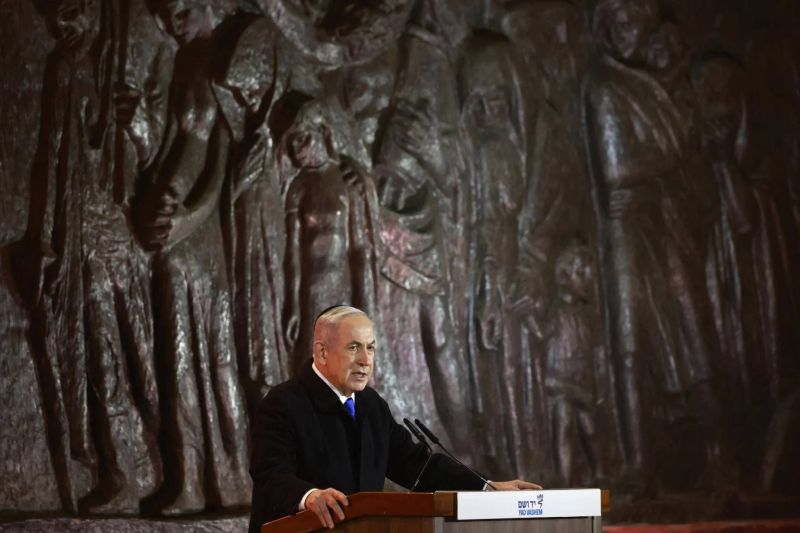
Israel's Prime Minister Benjamin Netanyahu speaks during a ceremony marking Holocaust Remembrance Day for the six million Jews killed during World War II, at the Yad Vashem Holocaust Memorial in Jerusalem on May 5, 2024. (Credit: Menahem Kahana/AFP)
An Israeli law, passed in 2014 during a previous mandate of Prime Minister Benjamin Netanyahu, could "hamper" the approval of any potential deal between Israel and Lebanon aimed at securing a lasting cease-fire in the ongoing conflict between Israel and Hezbollah, Haaretz reports.
The Israeli army and Hezbollah have been engaged in active conflict along the Lebanese-Israeli border since Oct. 8.
According to the Israeli newspaper, this law stipulates that any agreement involving the relinquishment of Israeli territory under sovereignty must receive approval either through a national referendum or by a significant majority of 80 out of the 120 members of the Knesset. This requirement is more stringent than typical Knesset votes, which usually demand a simple majority or no formal approval from the Knesset at all.
Revoking this law would necessitate support from only 61 Knesset members.
Currently, the Biden administration is engaging in discussions regarding potential alterations to the land borders between Israel and Lebanon, aiming to de-escalate tensions in the northern region. US special envoy Amos Hochstein has made back-and-forth trips between Beirut and Tel Aviv in an effort to reach a deal that would notably solve yearslong disputes regarding the land border between the two countries. There are presently 13 points of contention along the Blue Line, which is the withdrawal line presently in force to demarcate the border between Lebanon and Israel.
Political insiders, according to Haaretz, suggest that Netanyahu might encounter difficulty in securing a two-thirds majority in the Knesset if any border changes involve territorial concessions, thereby potentially necessitating a referendum on the matter.
However, a senior political figure told Haaretz that Netanyahu would face challenges in garnering backing for such concessions, especially from the right-wing constituency, due to ideological reservations. This sentiment extends beyond ministers and Knesset members affiliated with far-right parties like Otzma Yehudit and Religious Zionism, encompassing those from Netanyahu's Likud party as well as Gideon Sa'ar, chairman of New Hope, and potentially other members of New Hope.
Conversely, the primary opposition party, Yesh Atid, is likely to lend support to such an agreement, provided it meets the approval of organizations representing northern residents, the Israeli newspaper also reports.
In 2022, during Yair Lapid's tenure as prime minister, an agreement was reached to delineate Israel's maritime borders with Lebanon. Notably, this agreement pertained to areas beyond Israel's sovereign control and thus did not require any specialized approval process. However, government sources allegedly told Haaretz that the 2014 law would be applicable to any agreements concerning land borders.
The enactment of this law aimed to hinder future governments from relinquishing areas annexed to Israel. It would not be applicable to territorial concessions in the occupied West Bank, which has not been annexed. Nevertheless, it would be pertinent to the areas annexed in Jerusalem and the Golan Heights.
